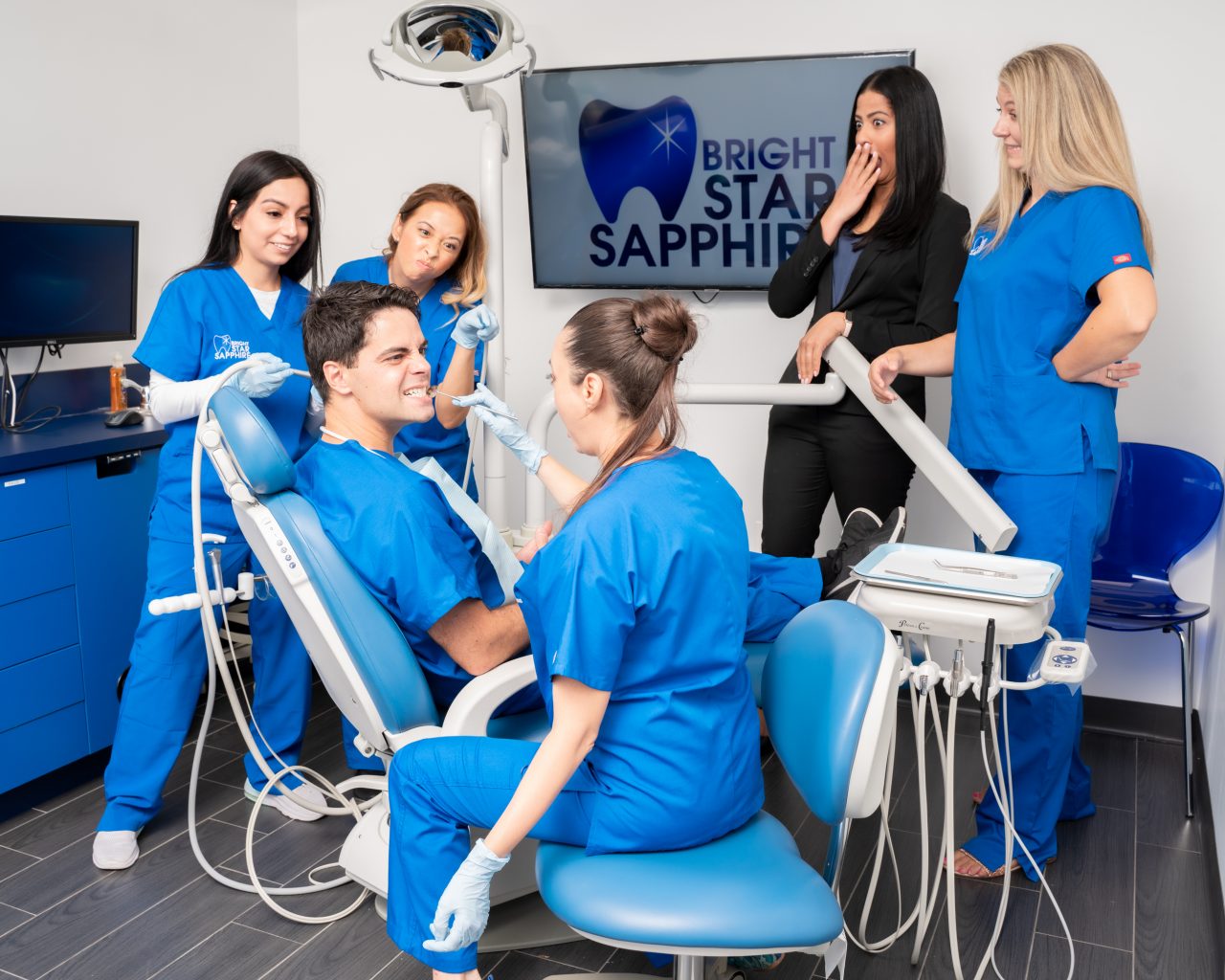When deciding on a restorative solution it is important to look at all of your options to help you decide on the best option that works for you. A common question patients face is if they should choose a dental bridge or dental implants when they are looking for a tooth replacement solution. Both are restorative solutions for missing teeth, and it is helpful to understand the differences. At Bright Star Sapphire Dental in Fair Lawn, NJ, we provide our patients with a thorough consultation to examine their teeth & mouth and will discuss the differences between all of the restorative options available. Our staff works closely with our patients to help choose the best solution.
What Is a Dental Bridge?
A dental bridge is a fixed restoration that fills the gap created by one or more missing teeth. Bridges are anchored to one or more neighboring teeth also known as abutment teeth. Bridges can be supported by natural teeth or by dental implants. The false teeth are in-between and are called pontics.
How Do Dental Bridges Work?
During your first appointment at our dental office in Fair Lawn, NJ we prepare the neighboring teeth. The preparation for a bridge involves removing part of the enamel to allow room for the crown. The crowns are placed over the neighboring teeth. Impressions of your teeth are taken to make the bridge in the lab, and temporary bridges are used while you wait for your permanent bridge.
Patients return to the office, and we remove the temporary bridge to prepare for the permanent bridge. The new bridge is installed, and we check to make sure the bridge is comfortable, and the perfect fit. Patients may have to return to our office again to ensure the bridge is working well with your bite. Once we know the bridge fits properly we will cement the bridge in place.
How Long Will Dental Bridges Last?
Dental bridges last around 10-15 years. Bridges do involve using some of your natural teeth, and this can cause your bridge to fail over time. The teeth around the bridge are still vulnerable to decay and disease which can attribute to the life of the bridge. Patients must practice good oral hygiene habits at home to keep the bridge and surrounding teeth clean. Dr. Boris Kleyman & Dr. Denada Kleyman, our dentists in Fair Lawn, NJ recommend brushing twice a day and flossing to ensure you carefully clean around both the false and natural teeth. Visiting our office regularly can help to keep your teeth clean, and your bridge looking and feeling great.
What Are the Benefits of Dental Bridges?
- Surgery is not required
- Dental bridges tend to be less costly compared to implants
- Jawbone density is not an issue with bridges
- Overall the bridge procedure is less invasive compared to dental implants
What Are Dental Implants?
Implants are a permanent solution for patients that have missing, broken, or damaged teeth. They are durable, and act similar to a screw that is placed into the jawbone. The screw acts like an artificial tooth root, and provides a strong base for one or more artificial teeth. Implants require a healing period to give the implant time to fuse to the jawbone. This process allows the implant to function just like a natural tooth.
How Do Dental Implants Work?
Dental implants require multiple appointments in our dental clinic in Fair Lawn, New Jersey, and the process takes a few months. The first step involves placing the implant into the patient’s jawbone. Once this is done there is a healing period where we must give the implant time to fuse to the jawbone. This process is known as osseointegration.
Part of our implant evaluation process is to determine if the patient has adequate bone in the jaw to support the implants. If needed, bone grafting can be done to give patients the bone required to provide the necessary support. Once the healing process is complete the patient returns to our office, and an abutment or connector is placed on top of the implants. This allows the crown to be secured to the implant. Custom crowns are made to match the size, shape, and color of your natural teeth. Temporary crowns may be used while patients wait for the permanent crowns to be installed.
How Long Will Dental Implants Last?
Dental implants are durable and last upwards of 25 years, or a lifetime if they are cared for properly. Implants are built out of titanium, and provide patients with a permanent solution for missing teeth. Caring for dental implants is like caring for natural teeth, and Dr. Boris & Denada Kleyman recommend practicing good oral hygiene habits at home to keep your implants looking and feeling great.
What Are the Benefits of Dental Implants?
- Dental implants are long lasting, and are a permanent restorative solution
- Easy to care for
- Implants function like natural teeth
- Chewing power is restored with dental implants
- Speech and overall appearance are improved
- Patients can eat all the foods they normally would with implants
- Dental Implants tend to cost more, but are a good investment because they are built to last

Looking for a Dentist to Provide Dental Implants or Dental Bridges Near You?
Choosing the best restorative option is a big decision, and our team is here to help. Our consultation process will answer all of your questions, and we will discuss what option may work best for you. We want our patients to be proud of their smile, and our team works to give patients the highest level of care. At [insert practice name], we welcome our patients in a comfortable and relaxing environment using state of the art technology. Creating beautiful smiles is what we do, and we take pride in giving patients a smile they can be proud of.
If you are interested in finding out more about your restorative options such as dental implants or dental bridges, please contact Bright Star Sapphire Dental in Fair Lawn, NJ to schedule your consultation.





